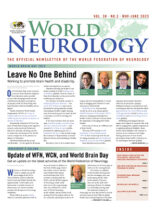It is an immense honor to be nominated for the position of WFN trustee.

Lawrence Tucker
After completing a laboratory-based, neuroscience PhD in Cambridge as a young doctor in 1993, I returned to train as a neurologist in sub-Saharan Africa where neurologists to general population average one per five million. I now head of neurology at Groote Schuur Hospital and the University of Cape Town’s Neuroscience Institute. I am president of the College of Neurologists of South Africa and past president of the Neurological Association of South Africa. I also sit on the boards of various other national, neurological, professional, and academic bodies
I am a general neurologist with an interest in epilepsy, but my passions lie in the advancement of neurological education, training, clinical practice, and advocacy, especially in resource constrained environments. Little surprise, then, that working with the WFN over the past decade has been a privilege and source of great personal fulfilment. I have been a WFN delegate for almost a decade and served on many WFN committees (core education, grants, public awareness and advocacy, RTC, e-Learning, 2023 WCN, and finance). In these and other roles, it has been a pleasure and honor to interact with esteemed WFN colleagues, including four presidents, trustees, and many other office bearers.
I am grateful to the WFN for providing me with opportunities to pursue its mission. For example, using WFN seed sponsorship, our Cape Town group developed an intensive, annual, 6-month, distance learning program for electroencephalography training, which has enrolled well over 1,000 neurology residents and neurologists, predominantly from lower and middle income countries during the past seven years. However, I regard working closely with the WFN and African colleagues to establish the African Academy of Neurology (AFAN) in Dakar (2017), and setting up the Cape Town WFN Regional Training Center (2019) as two particularly significant personal achievements.
Since its inception, I have been treasurer, vice president and, most recently, president-elect of AFAN, which is now well-established and collaborates with the WFN and other international, regional, and national bodies globally to promote neurology in Africa. Among other activities, AFAN runs biennial congresses and, jointly with the WFN, virtual annual e-Learning days and advocacy programmes.
The Cape Town WFN RTC, which I head, is the only Anglophone WFN RTC in the southern hemisphere. It offers career neurology training, as well as clinical fellowships (in stroke, epilepsy, neuroinfection, neuromuscular disorders, and clinical neurophysiology) for neurologists practicing in lower and middle income countries in sub-Saharan Africa.
If elected as trustee, I will continue to work with WFN colleagues toward our organization’s goal of quality neurology for all. This will involve strengthening established collaborations with national, regional, and international organizations, including the WHO; expanding the WFN’s existing and already successful educational, e-Learning, visiting fellowship and RTC programs; and supporting new, inclusive initiatives between the global north and south to promote the WFN’s mission in Africa, South and Central America, Asia, Oceania, and all regions in the world where neurologists and neurological expertise remain scarce. •
